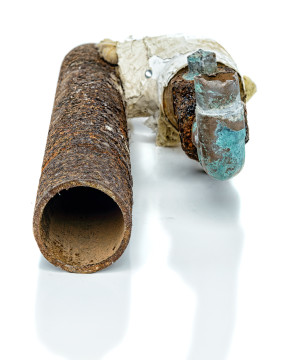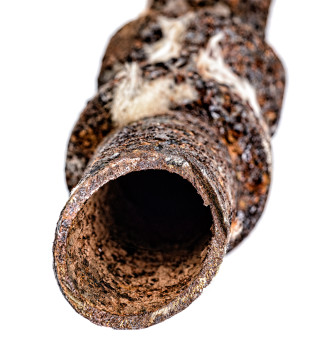SageWater has extensive experience in the turnkey replacement of closed-loop hydronic riser systems and associated header piping. As a closed-loop systems age, the pipe insulation deteriorates. As a result, condensation often causes these systems to corrode from the pipe’s exterior. In fact, its not uncommon to find hydronic pipe literally crumbling apart inside a building’s walls.
Replacing these pipes doesn’t just solve the leak problems and eliminate resident inconveniences; today’s new piping systems with improved insulation significantly increase efficiency, making an HVAC repipe a green solution. Likewise, fan coil unit (FCU) replacement as part of a closed-loop repipe further improves the overall system efficiency.

What Happens as Hydronic Systems Age?
As hydronic systems age, the insulation on the main loops, the risers, and the runouts that feed individual units deteriorates. Condensation from temperature changes then occurs more readily on the outside of the pipes and corrodes these systems from the exterior. It’s not uncommon to find hydronic pipe literally crumbling apart inside walls. (photo)
As the insulation fails, the system loses efficiency. The more complex components (boilers, chillers, pumps, and FCUs, for example) work harder to heat and cool the property, placing greater strain on them.
Anticipating Problems
Hydronic problems tend to occur in climates with cold winters and hot summers. HVAC piping systems wear out more quickly because of condensation which wears away the pipe’s insulation. This condensation is caused from temperature differences between the ambient air temperature and the water temperature inside the pipe.
 Planning Ahead
Planning Ahead
Hydronic repipes can require a significant capital expense, so planning ahead for these projects is critical. For apartment complexes, this means understanding the scope and magnitude of the problem and budgeting accurately. For condominiums, co-ops, and other shared ownership structures, it means conducting reserve studies, securing financial reserves, and reallocating other investments to complete the repipe before it becomes even more expensive.
When the Problem Can No Longer Be Ignored
SageWater has extensive expertise in working with insurance companies, lenders, engineering firms, property managers, and building owners to address the challenges of a hydronic repipe.
